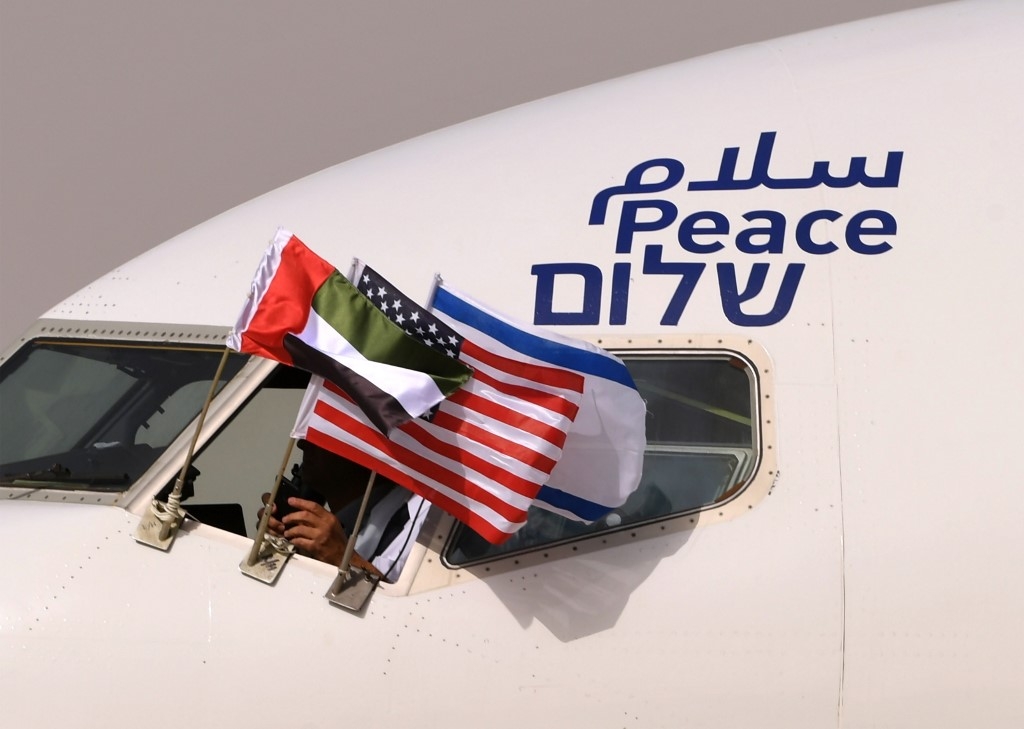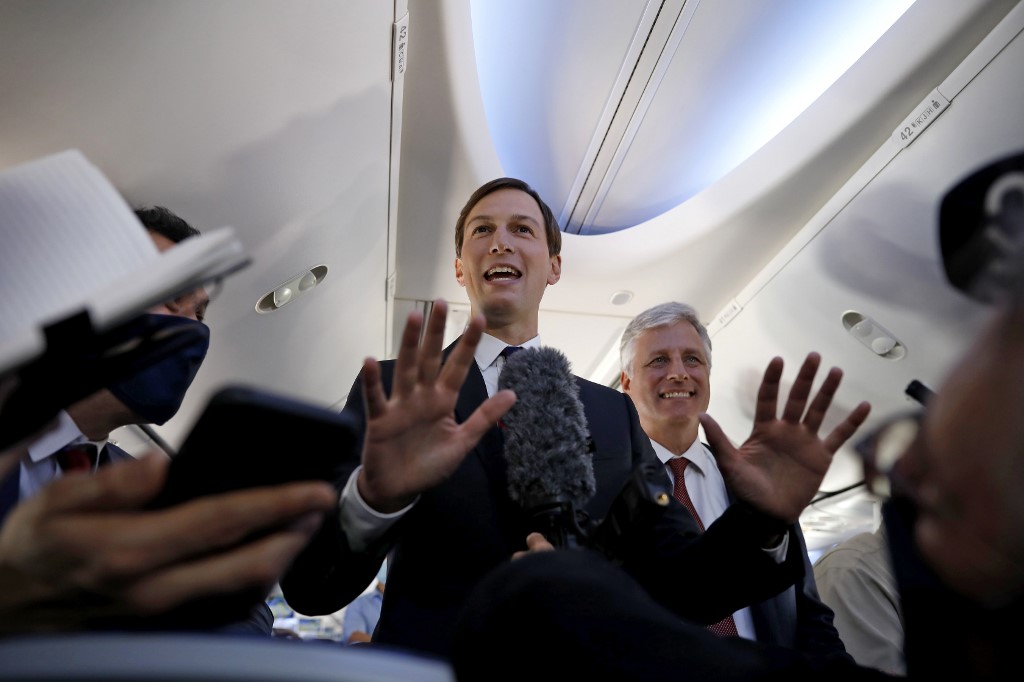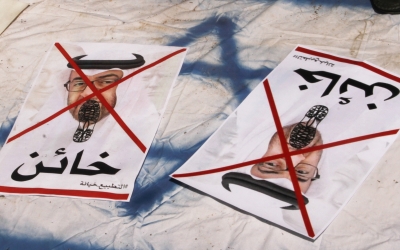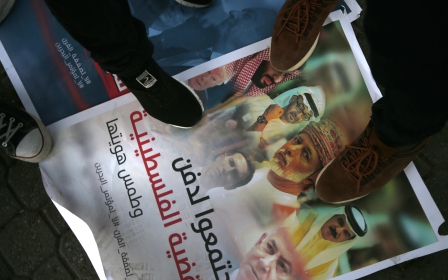Israel's flight to the UAE: Taking the Emirates for a ride

When the doors of El Al flight LY971 opened at the Abu Dhabi airport, it confirmed the recognition and acceptance by the UAE of the 21st century’s most blatant apartheid state, Israel.
Let there be no doubt: this was not a “peace for peace” deal between two peaceful countries. Israel is a racist, serial violator of international law, and an oppressive human rights abuser that should face accountability and isolation for its crimes against the Palestinian people.
Did the Emiratis check the English, Arabic and Hebrew versions for accuracy?
The UAE, meanwhile, is engaged in many non-peaceful adventures that have heaped misery, death and destruction - especially upon Yemen.
The flight that brought an American and Israeli delegation to the UAE to work on the peace deal flew over Saudi airspace. Nearly three years ago, I had wondered how long it would take for the Israeli flag to fly over Riyadh. This week, that flag flew over Riyadh, adorning flight LY971 en route to Abu Dhabi.
Saudi Arabia gave “permission” for the Israeli plane to fly over its airspace, despite no formal relations existing between the two countries. The home of the two holiest mosques in Islam in Mecca and Medina allowed the national carrier of a country that illegally occupies the third holiest mosque, al-Aqsa, to break a decades-long ban and fly over Saudi airspace - and for what?
New MEE newsletter: Jerusalem Dispatch
Sign up to get the latest insights and analysis on Israel-Palestine, alongside Turkey Unpacked and other MEE newsletters
Saudi Arabia did not need to give permission for this plane to fly over its airspace. It could have at least waited to see how genuine Israel was in negotiating an equitable deal with the UAE.
It could have waited until Israel committed to taking its annexation plan off the table. It could have waited until the White House committed to the sale of F35 jets to the UAE. The 3.5-hour flight could have taken twice as long if Saudi Arabia had not given permission.
If Saudi Arabia, the UAE’s co-leader of the war on Yemen, had kept that overflight card until it had read the statement issued by the UAE, the US and Israel, it might have realised that Israel had not made any concessions in return for normalisation with the UAE.
Every word matters
Language at this level matters immensely; note the reference to annexation in the Arabic and English versions of the statement. In Arabic, the statement notes: “The accord … led to a halt to Israel’s plan to annex Palestinian lands.” In English, it states: “The accord … has led to the suspension of Israel’s plans to extend its sovereignty.”
In other words, the Emiratis were taken for a ride. Neither Israel nor the US refers to Palestinian lands. Instead of clearly stating that it will halt annexation, Israel has only committed to suspending the extension of its sovereignty. Did the Emiratis check the English, Arabic and Hebrew versions for accuracy?
The moral of this story is that for those Arab countries considering normalising relations with Israel, every word matters. For Israel, every word is designed to protect its interests, and once an agreement is signed, Israel will hold the other party to every clause, while reneging on its own commitments because it knows it will face no accountability.
Ask Palestinians about their bitter experiences with the disastrous Oslo Accords. Had Israel acted in good faith, a Palestinian state should have been born in 1998; instead, there are hundreds of thousands of Israeli settlers living on occupied Palestinian lands.
Or ask Jordan, with whom Israel signed a peace treaty in 1994. Custodianship of the holy places in occupied East Jerusalem, including al-Aqsa Mosque, which was at the heart of the treaty, is under threat.
Israel and the US claim that the “status quo” that has operated since East Jerusalem’s occupation in 1967 is not under threat - yet, on the ground, that status is being eroded daily, and Jordan’s custodianship over the holy sites has never been in greater peril.
Peace for nothing
The UAE-Israel deal is in line with Israel’s plans to control al-Aqsa under US President Donald Trump’s “deal of the century”. The accord between the UAE and Israel effectively allows Muslims to “visit al-Aqsa”, but coordination appears to be with Israel rather than the Jordanian Waqf, as existing arrangements dictate.
Other Arab states considering normalisation with Israel will probably think that they can fare better than the Palestinians, Jordanians and even the Egyptians did. They will not. They need only to listen to the words of Israeli Prime Minister Benjamin Netanyahu since the initial announcement of the deal with the UAE.
But I fear that they will not bother, and there will be further normalisation deals before the US presidential election in November. There is much speculation that Oman, Bahrain and Sudan may succumb to US presidential adviser Jared Kushner’s charms in the coming weeks.
I assume the US and Israeli delegations will be well looked after in the UAE, including a possible trip to the top of the Burj Khalifa, the world’s tallest building. A kilometre up in the Dubai sky, the delegations could look eastwards and almost see and feel Iran. They would use that proximity to convince the Emiratis of the danger Iran poses, and of why establishing a united front that includes Israel is vital to protect them.
They would avoid looking south, as the difficult question of Yemen could arise. They would look west and feel that by allowing their plane to fly over Saudi airspace, Riyadh was slowly moving from operating under the table to more blatant normalisation - although this could take a bit of time.
Palestinian liberation
It is when they look towards Palestine and Israel, however, that they would remember that even if they normalise with every Arab country, they would still not have true peace. That can come only when the Palestinian people achieve their aspirations of freedom, justice and equality in their historic homeland.
For Palestinians, it is time to wake up, smell the coffee and realise that more of the same negotiations with Israel under different auspices will not work
Israel curses the fact that there are still millions of Palestinians, now more than Jewish Israelis, in the land it considers the biblical homeland of the Jewish people. Israel may push Palestinians into bantustans, and continue to oppress and occupy them - but unless it physically drives them out of historic Palestine, it will not achieve Zionism’s vision.
The delegations in the UAE might believe that their endeavours will bring peace to the holy land. But Israelis who are celebrating the Israel-UAE deal should think longer term, and realise that only peace with Palestinians will bring about real peace.
For Palestinians, it is time to wake up, smell the coffee and realise that more of the same negotiations with Israel under different auspices will not work. It is time for real change, and for them to be the disrupters - rather than to allow Netanyahu and Trump more opportunities to disrupt their national liberation project.
The views expressed in this article belong to the author and do not necessarily reflect the editorial policy of Middle East Eye.
Middle East Eye delivers independent and unrivalled coverage and analysis of the Middle East, North Africa and beyond. To learn more about republishing this content and the associated fees, please fill out this form. More about MEE can be found here.







